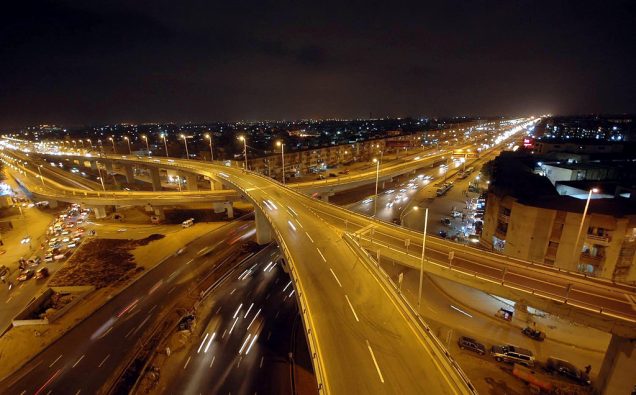
A view of lit up highway network in Karachi Image Credit: newsphoto90/suleman sajjad (Nagan Ch, Karachi) / Wikimedia Commons
Pakistan has the potential to grow into a $2 trillion economy in the next 28 years if the country marches on its reforms process and controls the population expansion, a senior World Bank official says.
“With sustained reforms, Pakistan could be a $2 trillion economy when it will turn 100 in the next 28 years,” the Bank’s Country Director Patchamuthu Illangovan said.
He was speaking about the country’s future economic prospects as noted in the new ‘Pakistan @100- Sharing the Future 2047′ report.
The country faces two scenarios – one vibrant with reforms, investments, population growth moderation and planned development helping it to fruition of the potential.
The other is underperformance where the country does not go ahead with much-needed fiscal and institutional reformation and stagnates at a much lower pace of growth.
The first scenario demands some key steps and their implementation.“The $2 trillion economy means an upper middle-income country where per capita income will be $5,702 but it will have to halve its population growth rate to 1.2% by 2047,” according to Illangovan.
Analyst and experts have long seen Pakistan as a country endowed with rich potential and an advantageous strategic location to emerge as a huge Asian economy.
But years of war on the country’ Western border in Afghanistan and its deadly fallout in the form of terrorism and homegrown militancy and longstanding tensions and conflicts with India on the Eastern border have consumed a lot of resources.Additionally, a lack of planning and poor economic governance have kept the country from realizing its true promise.
“I have long been saying that Pakistan could be a much bigger economy, even more than $2 trillion in a matter of decades, if it focuses on human development.
“In fact, I see more than 100 million young Pakistanis as the greatest human capital for the country, who can turn around the country if we equip them with education, skills and technological expertise,” Jehangir A Raja, a top Pakistani-American expert and CEO at JR Dallas Wealth Management, says.
But now after years of ups and downs in the last two decades, Pakistan appears to be on a path to attracting huge investments.China Pakistan Economic Corridor with its more than $50 billion energy and infrastructure projects and the recent Saudi announcement of around $20 billion investment indicate a growing confidence in the country’s economic future.
Yet, there are challenges including an effective plan to reduce poverty, generate jobs and achieving macroeconomic stability.
Besides ensuring transparency and fair distribution of economic gains, the country must continue to build up its foreign exchange reserves in the immediate context and focus much more on the human development with education and health plans to realize the goal of becoming a major Asian economy.





![By Fassifarooq [CC BY-SA 4.0 (https://creativecommons.org/licenses/by-sa/4.0)], from Wikimedia Commons](https://www.viewsnews.net/wp-content/uploads/2018/04/Faisal_Mosque_Islamabad_III.jpg)
![By Umargondal (Own work) [CC BY-SA 4.0 (http://creativecommons.org/licenses/by-sa/4.0)], via Wikimedia Commons](https://www.viewsnews.net/wp-content/uploads/2016/11/Gwadar_port-1.jpg)
![By Faisal7714014 (Own work) [CC BY-SA 4.0 (http://creativecommons.org/licenses/by-sa/4.0)], via Wikimedia Commons](https://www.viewsnews.net/wp-content/uploads/2016/06/Lahore_Ring_Road_Saggian_Interchange-1.jpg)








